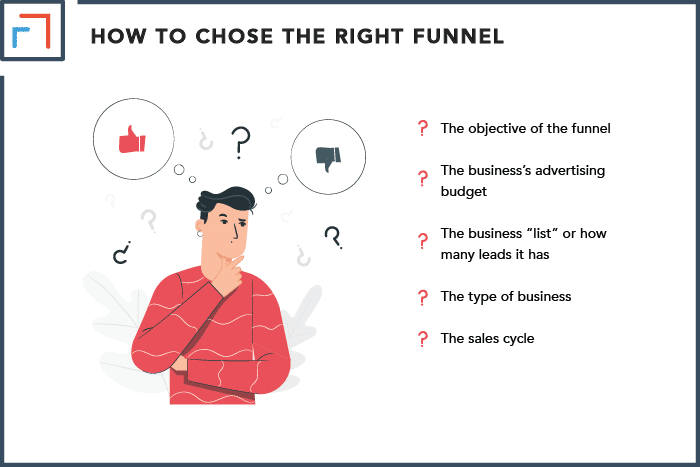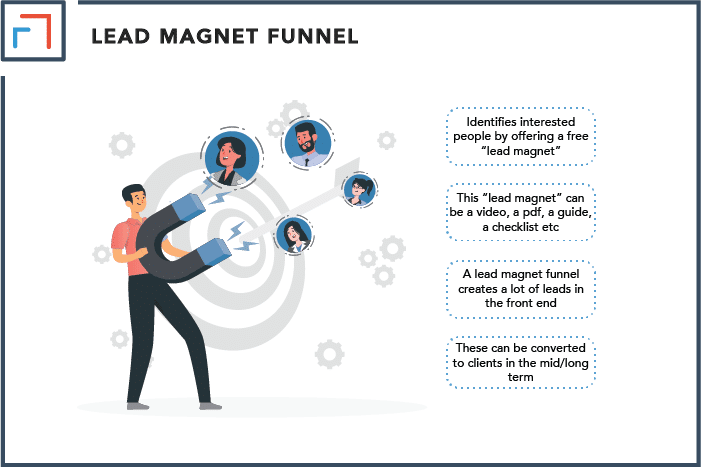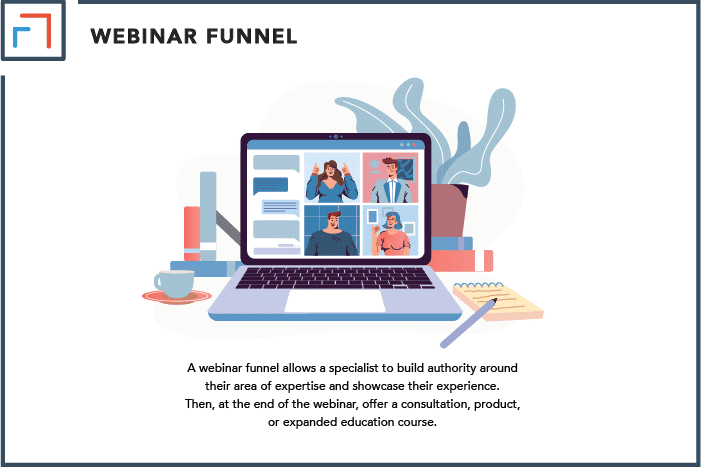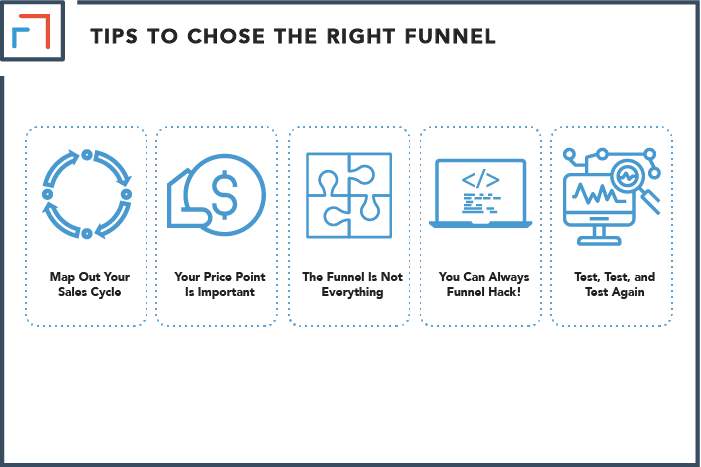With the amount of emphasis that’s placed on sales funnels, it might seem like your business is destined to fail if you don’t have one. Is this the truth, or is a sales funnel optional?
Every brand needs some sort of funnel because a thriving business needs a way to consistently bring in new customers. A funnel makes this happen by using targeted strategies to make more sales, increasing product visibility, growing a customer base, and ultimately helping the business grow.
In this article, we’ll explore how your business can benefit from a funnel and how you can choose the right funnel to achieve your business goals. We’ll also cover a real-world funnel example and how to apply the principles successfully.
Why Does a Business Need a Funnel?
A business needs a funnel because funnels make it easier for businesses to grow by removing the barrier to bringing in new clients. This creates consistency and allows the company to grow accordingly. In addition, once buyer habits have been set, they’re easier to analyze and change.
A successful funnel also provides businesses with enough data to ensure there’s a return on investment.
Everyone wants to know that their advertising money is being well spent! Funnels give predictability and security to business owners.
How to Choose the Right Funnel for my Business?
Every business needs a good sales funnel. However, this does not mean just any type of sales funnel will work for your business.
Matching the proper funnel to a business will depend on multiple factors like:
- The objective of the funnel
- The business’s advertising budget
- The business “list” or how many leads it has
- The type of business
- The sales cycle
To choose the right funnel for your business, you first need to consider your type of business.
There are three types of business you could use different funnels for:
- E-commerce Businesses
- Service-Based Businesses
- Brick & Mortar Businesses

1. E-commerce Businesses
This type of business includes any sale that’s dependent on the internet.
E-commerce businesses use the internet to sell physical products like supplements, clothing, gadgets, etc.
This segment also includes information products like online courses, software, ebooks, audiobooks, etc.
The best and most commonly used funnel for eCommerce businesses is a trip-wire funnel.
The Trip-Wire Funnel
This type of funnel is engineered to offer a great deal to the prospect at the front end (in which the business doesn’t make any money) and then increase the order value with order bumps, upsells, and one-time offers.
An excellent example of a Trip-Wire funnel is the “Free + Shipping” in which the business offers to send some free products and then offers something else (usually more of that product) in the backend.
By applying this strategy, businesses can afford to lose money on their first offer because they increase the order value with backend offers.
The trip-wire funnel brings in more revenue, captures new leads, and locates new customers that the business can market to in the future.
2. Service-Based Businesses
This type of business depends on the internet to make sales, but unlike eCommerce businesses, the delivery is not a physical product or information packaged as a product.
Instead, they offer a service geared to create a specific outcome or solve a particular problem.
Online counseling, graphic design work, and similar industries fall under this category.
The margins for delivering services are higher, allowing these businesses to spend more money on advertising to get new clients.
Below we’ll cover the two most commonly used funnels for service-based businesses.
Lead Magnet Funnel
This type of funnel helps you identify people who might be interested in your service by offering a free “lead magnet” in exchange for their contact information.
If people sign up, this puts them on a list of prospective customers. This “lead magnet” can be a video, a pdf, a guide, a checklist, etc.
Once they sign up for the free lead magnet, they will get redirected to a thank you page where there is an option to schedule a free consultation call or strategy session with the business.
Because most people won’t schedule the consultation call straight away, the business must have a follow-up sequence prepared.
A lead magnet funnel creates a lot of leads in the front end, which can be converted to clients in the mid/long term.

The Webinar Funnel
This type of funnel works by getting people to attend a “Free Masterclass” or “Webclass” in which you deliver some value to the guests.
By the end of the presentation, the speaker would pitch the offer and use marketing elements like scarcity and urgency to urge people to sign up for the service.
The hardest part of making this funnel work is getting people to show up to the class.
Some software programs solve this problem when the webinar is pre-recorded; however, getting people to show up to a live webinar can be more challenging.
With this type of funnel, businesses can quickly deliver value and build up authority in their niche.
In addition, they get to collect leads and close a portion of the deals.
3. Brick & Mortar Businesses
This type of business does not necessarily use the internet to sell its products or services.
For example, gyms, chiropractors, dentists, doctors, lawyers, and real estate agents fall under this category.
Many people think that because their businesses have a physical location, they can’t use funnels to sell their products. This couldn’t be farther from the truth!
Funnels can also help “offline businesses” create new leads, build authority and goodwill in their market, and consistently make new sales.
Because there are many types of business in this category, and we’ve already covered how some of the best performing funnels work, this section will give you examples of how brick & mortar businesses can apply the strategies of previous funnels.
Lead Magnet Funnel for Brick & Mortar Business
A gym or a real estate agent could greatly benefit from a lead magnet funnel.
Coming up with lead magnets has a lot to do with creativity and understanding what your target audience wants.
However, there are some tried and true lead magnet concepts that rarely fail.
For instance, a gym could create a free 60-day bodybuilder workout plan to bring in people who are interested in bulking up.
This offer can be adjusted to attract those who are interested in yoga, weight loss, or other facets of the fitness world.
When someone registers for this program, direct them to a thank you page, where they might receive an offer for 20% off their first month.
Continue to provide value to new customers so they want to stay.
Similarly, a real estate agent could offer a free pdf with a listing to attract buyers or “The Ultimate Guide with 150+ Tips to Selling Your Home” to attract sellers.
They could add a calendar link on the thank you page to schedule a free call with the realtor.
Continue to collect contact information wherever possible so you can send follow-up emails and promotions.
The Webinar Funnel for Brick & Mortar Business
Business owners like dentists or chiropractors will benefit significantly from webinar funnels.
When it comes to healthcare, people need to trust the experience and qualifications of the specialist that’s going to treat them.
A webinar funnel hits both objectives because it allows the specialist to build authority around their area of expertise and showcase their experience.
A webinar aims to solve a specific problem.
For instance, a chiropractor could use something like “Free Webclass: The best at-home exercise to reduce back pain.”
A dentist could use a “Free Webclass: The ultimate guide to dental implants” where they explain the consequences of missing teeth and the long-term value of dental implants.
Then, at the end of the webinar, offer a consultation, product, or expanded education course.

The Trip-Wire Funnel for Brick & Mortar Business
Businesses like retail stores can benefit from Trip-Wire funnels.
The concept is no different from eCommerce stores; usually, the business would pick their best-selling product as a lead magnet or introductory “free + shipping” offer.
The business can offer “express shipping” for their order bumps to increase the average order value.
And then, for their first upsell, they will usually offer more of the same product (which is highly recommended!)
After the initial purchase, they can keep sending marketing emails offering new discounts and prompting people to try other products.
Tips To Choose The Right Funnel For Your Business
1. Map Out Your Sales Cycle
If you map out your process, it will be easier to match your business with the right funnel. Do not reinvent the wheel.
9 out of 10 times, your funnel will be an online replica of your current sales process.
2. Your Price Point Is Important
The sales cycle for a $49 product will not be the same one you use for a $2k service. Don’t expect this to be any different with a sales funnel!
A low-ticket product is usually an impulse decision that doesn’t take a lot of effort to sell.
However, for a high-ticket sale to occur, there needs to be a certain level of trust between you and your customer.
Thus, you’ll need to place a higher emphasis on communication and education for these items.
3. The Funnel Is Not Everything
Choosing a suitable funnel is just one part of the puzzle. Even the most amazing funnel won’t work if your message doesn’t speak directly to your customers.
You need to put in the work to gather data about your customers and create good content for them.
4. You Can Always Funnel Hack!
Unless your product or service is a brand new innovation, there’s probably a funnel that already exists for it.
Research your competition, look at what they are doing, and figure out why it works.
Then you can use the old “Funnel Hacking” concept to replicate what they are doing and adapt it to your specific business.
5. Test, Test, and Test Again
If you are new to the world of funnels, your first funnel will likely underperform.
You will need to make a few changes and test different funnels until you find the right one for you.
Don’t give up; finding the ONE funnel that will change things for your business is worth it.

Sales Funnels at Work
To highlight the need for funnels, let’s look at a real-life example that I helped with:
Filling up an orthodontist’s schedule and increasing their revenue with a Webinar Funnel.
A common problem for dentists, chiropractors, and other health care providers is finding a way to schedule more appointments for their services.
Now, there are two things to keep in mind:
- These services are inherently urgent.
- These specialists are usually very good at the “selling” part of their services.
- Most of the time, they fail at the “marketing” part.
That’s where a good sales funnel can change everything!
1. The Problem
If you don’t have enough leads coming through your door, it’s hard to grow your practice, no matter how much expertise you have under your belt.
Orthodontists tend to rely on word of mouth for their marketing, and, in some cases, they run some social media ads (usually without success).
When I started working with this client, he only wanted more “butts in seats.”
The practice owner is an orthodontist who knew his perfect patient very well; he even had a working ascension strategy or value ladder.
Basically, he knew how to increase the value of each patient over time.
2. The Process
At first, I thought a lead magnet funnel would do the job, but after a week without much success, I knew I had to change my strategy.
By talking with the client, I realized his sales process relies entirely on him.
The treatment explanation or “sales pitch” he uses with people who have a TMJ disorder is mostly the same for every case.
BINGO!
With the intel about the “perfect patient” + a proven sales pitch, I knew that a webinar funnel would be perfect for his services.
So I got a recording of a live examination or “sales pitch” with an actual patient, and I adapted it into a webinar format for the orthodontist to record.
3. The Results
The results were mind-blowing.
We called out their “perfect patient” on the advertising (Facebook Ads), and after just nine days, we had to turn off the funnel because his schedule was filling up too fast!
70% of these patients closed on the spot, and the rest needed some time to begin the treatment.
As I mentioned before, his ascension strategy was so good that 50% of new patients took “the upsell” (their TMJ problems were due to some other problem that needed a more expensive orthodontics treatment).
This funnel made a stark difference in how this dentist ran his practice.
And, of course, whenever new patients came into the practice through the webinar funnel, they already knew, liked, and trusted the dentist.
This was a great way to highlight that even a physical business can benefit from an effective funnel.
Conclusion
Now you know why any business can benefit from having a sales funnel. As you saw through the examples, not every funnel will fit any business.
It’s important for you to understand your sales cycle and many other factors that will help you choose the right funnel for you.
If you follow the tips and concepts explained in this article, I’m sure you’ll find the perfect funnel for your business.
